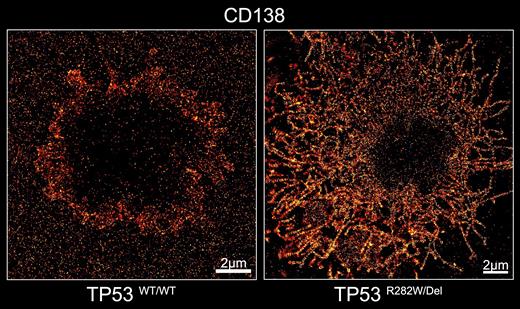Background:
Multiple myeloma (MM) is characterized by complex genomic aberrations including primary translocations of the immunoglobin heavy chain (IGH) locus and secondary mutations involving key oncogenic drivers. This temporal complexity represents a constant challenge for the clinical management of MM, but at the same time may provide new avenues for immunotherapy-based approaches including CAR-T cells and T-cell engaging antibodies. In this study, we investigated the impact of secondary genetic events on the surface expression of common targets for immunotherapy in MM.
Methods:
Cell models harboring two hotspot activating mutations in KRAS (G12A, A146T) and TP53 (R282W) were created using the MM cell lines OPM-2 and AMO1 via CRISPR-Cas9 technology. Direct stochastic optical reconstruction microscopy ( dSTORM) was used for high-resolution receptor density estimation and epitope quantification of common immunotherapeutic targets such as CD38, BCMA and SLAMF7.
Results:
dSTORM imaging of cell line models carrying patient-derived secondary genetic alterations revealed a distinct pattern linked to each mutation respectively. In KRAS G12A, we observed a reduction in BCMA density by 2-fold as compared to wild type cells (5.9 ± 0.3 vs. 10.8 ± 1.2 localization clusters/µm 2, p=0005). This reduction in BCMA surface expression was accompanied by a decrease in other key immunotargets, including SLAMF7 (6.0 ± 0.8 vs 11.8 ± 0.8 localization clusters/µm 2, p <0,0001) and CD38 (12.2 ± 1.5 vs 17.9 ± 1.6 localization clusters/µm 2, p=0,012). In KRAS A146, CD38 density increased, whereas mean BCMA and SLAMF7 localizations were consistently reduced as compared to wild type control. To ensure that BCMA downregulation is a consistent feature in genomic high-risk disease, we next simulated a TP53 double-hit situation by introducing an inactivating hotspot mutation R282W in a TP53 deletion background. Surfaceome profiling by dSTORM revealed a minor increase in CD38 levels for TP53R282W/Del as compared to wild type control (51.5 ± 5.7 vs. 36.4 ± 4.2 localization clusters/µm 2, p=0.06). Interestingly, the expression level of BCMA, known to be comparably low on WT tumor cells, further decreased in TP53 double-hit cells (0.6 ± 0.1 vs 1.1 ± 0.1 localization clusters/µm 2, p=0.002), whereas no major differences in the cluster density of SLAMF7 were observed. This leaves room for speculation whether these effects on biallelic TP53 inactivated tumor cells may underlie reduced susceptibility towards BCMA-targeting therapy. Of note, we also observed altered cell morphology in the TP53 double-hit model, characterized by elongated stress fibers enriched with CD138, potentially interfering with receptor accessibility of surface receptors (Figure 1). Recently, secondary genetic events have been reported in BCMA and GPRC5D following targeted immunotherapy inducing acquired drug resistance. We created cell models representing homo- and heterozygous genetic alterations in BCMA and GPRC5D, studies to assess their effects on the surfaceome are ongoing and will be presented at the meeting.
Summary:
Our data suggest that surface epitope expression in MM cells seems to be less agnostic to secondary genomic events than expected. These findings may provide a direct link between genetic high-risk disease and inferior efficacy of anti-BCMA immunotherapies in the context of e.g. TP53 double-hit MM.
Disclosures
Einsele:Takeda: Honoraria, Other: Consulting or advisory role, Travel support; GlaxoSmithKline: Honoraria, Other: Consulting or advisory role, Travel support, Research Funding; Amgen: Honoraria, Other: Consulting or advisory role, Travel support, Research Funding; Sanofi: Honoraria, Other: Consulting or advisory role, Travel support, Research Funding; Janssen: Honoraria, Other: Consulting or advisory role, Travel support, Research Funding; Bristol Myers Squibb/Celgene: Honoraria, Other: Consulting or advisory role, Travel support, Research Funding; Novartis: Honoraria, Other: Consulting or advisory role, Travel support. Waldschmidt:Oncopeptides: Consultancy; Pfizer: Consultancy; Takeda: Consultancy; Sanofi: Consultancy; Janssen: Consultancy. Rasche:GSK: Consultancy, Honoraria; BMS: Consultancy, Honoraria, Research Funding; Pfizer: Consultancy, Honoraria; Sanofi: Consultancy, Honoraria; Janssen: Consultancy, Honoraria; Amgen: Consultancy; Skyline Dx: Research Funding; Roche: Honoraria. Kortüm:Pfizer: Honoraria; GSK: Honoraria; Abbvie: Honoraria; Takeda: Honoraria; BMS: Honoraria; Janssen: Honoraria.


This feature is available to Subscribers Only
Sign In or Create an Account Close Modal